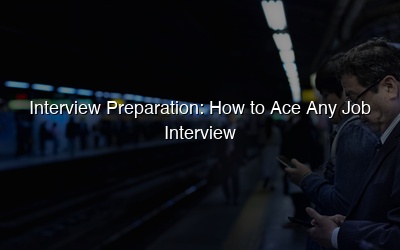Interview Preparation: How to Ace Any Job Interview
Master the art of interview preparation with proven strategies, common questions, and techniques that will help you succeed in any job interview.

Interview Preparation: How to Ace Any Job Interview
Job interviews can be nerve-wracking, but with proper preparation, you can approach them with confidence and increase your chances of success. This comprehensive guide will help you prepare for any type of interview and present yourself as the best candidate for the position.
Understanding Different Interview Types
1. Phone Interviews
Phone interviews are often the first step in the hiring process:
2. Video Interviews
Video interviews have become increasingly common:
3. In-Person Interviews
Traditional face-to-face interviews:
4. Panel Interviews
Multiple interviewers at once:
Research and Preparation
1. Company Research
Thoroughly research the company before your interview:
2. Job Description Analysis
Carefully analyze the job description:
3. Prepare Your Story
Develop compelling narratives about your experience:
Common Interview Questions and Answers
1. "Tell me about yourself"
Structure your response with:
Example:
"I'm a marketing professional with 5 years of experience in digital marketing and brand management. I've helped companies increase their online presence by 200% and drive $3M in additional revenue. I'm passionate about data-driven marketing strategies and am looking for an opportunity to lead marketing initiatives at a growing company like yours."
2. "Why do you want to work here?"
Show genuine interest and research:
3. "What are your greatest strengths?"
Focus on strengths relevant to the position:
4. "What are your weaknesses?"
Frame weaknesses as growth opportunities:
5. "Where do you see yourself in 5 years?"
Align with the company's growth:
Behavioral Interview Questions
1. STAR Method
Use the STAR method to structure your responses:
2. Common Behavioral Questions
Prepare examples for:
3. Preparing Your Examples
Have 8-10 strong examples ready:
Technical and Skills-Based Interviews
1. Technical Interviews
For technical positions:
2. Skills Assessments
For skills-based interviews:
3. Case Studies
For case study interviews:
Interview Day Preparation
1. The Night Before
2. Morning of the Interview
3. During the Interview
Questions to Ask the Interviewer
1. About the Role
2. About the Company
3. About the Team
Post-Interview Follow-up
1. Send a Thank-You Note
Send a personalized thank-you email within 24 hours:
2. Follow Up Appropriately
3. Learn from Each Interview
Common Interview Mistakes to Avoid
1. Lack of preparation and research
2. Arriving late or unprepared
3. Speaking negatively about previous employers
4. Not asking thoughtful questions
5. Failing to follow up after the interview
6. Being too casual or unprofessional
7. Not listening carefully to questions
8. Rambling or giving vague answers
Final Tips for Success
1. Practice, practice, practice - Rehearse your responses
2. Be authentic - Don't try to be someone you're not
3. Show enthusiasm - Demonstrate genuine interest
4. Listen actively - Pay attention to the interviewer's questions
5. Be prepared for anything - Have backup plans and examples ready
6. Stay positive - Maintain a positive attitude throughout
7. Learn from each experience - Use every interview as a learning opportunity
Remember, interview preparation is an investment in your career success. The more you prepare, the more confident and successful you'll be in your interviews.
Ready to Optimize Your Job Applications?
Put these insights into action with our AI-powered resume and cover letter generator. Create professional documents that get you noticed by employers.
No credit card required • Start in minutes
Share this article
Related Articles
More articles coming soon...